2011年6月英语六级考试冲刺练习:阅读篇
- 格式:docx
- 大小:136.19 KB
- 文档页数:47
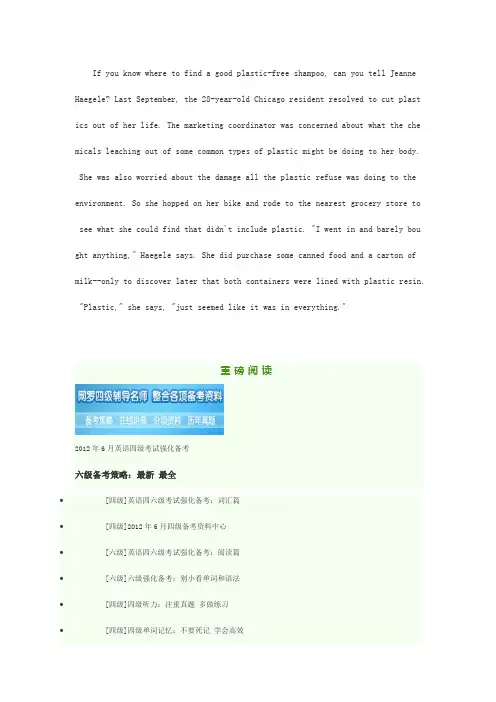
If you know where to find a good plastic-free shampoo, can you tell Jeanne Haegele? Last September, the 28-year-old Chicago resident resolved to cut plast ics out of her life. The marketing coordinator was concerned about what the che micals leaching out of some common types of plastic might be doing to her body.She was also worried about the damage all the plastic refuse was doing to the environment. So she hopped on her bike and rode to the nearest grocery store to see what she could find that didn't include plastic. "I went in and barely bou ght anything," Haegele says. She did purchase some canned food and a carton of milk--only to discover later that both containers were lined with plastic resin."Plastic," she says, "just seemed like it was in everything."重磅阅读2012年6月英语四级考试强化备考六级备考策略:最新最全∙[四级]英语四六级考试强化备考:词汇篇∙[四级]2012年6月四级备考资料中心∙[六级]英语四六级考试强化备考:阅读篇∙[六级]六级强化备考:别小看单词和语法∙[四级]四级听力:注重真题多做练习∙[四级]四级单词记忆:不要死记学会高效She's right. Back when Dustin Hoffman received the most famous one-word pie ce of career advice in cinema history, plastic was well on its way to becoming a staple of American life. The U.S. produced 28 million tons of plastic waste i n 2005--27 million tons of which ended up in landfills. Our food and water come wrapped in plastic. It's used in our phones and our computers, the cars we dri ve and the planes we ride in. But the infinitely adaptable substance has its da rk side. Environmentalists fret about the petroleum needed to make it. Parents worry about the possibility of toxic chemicals making their way from household plastic into children's bloodstreams. Which means Haegele isn't the only person trying to cut plastic out of her life--she isn't even the only one blogging ab out this kind of endeavor. But those who've tried know it's far from easy to go plastic-free. "These things are so ubiquitous that it is practically impossibl e to avoid coming into contact with them," says Frederick vom Saal, a biologist at the University of Missouri.Vom Saal is a prominent member of a group of researchers who have raised wo rrisome questions in recent years about the safety of some common types of plas tics. We think of plastic as essentially inert; after all, it takes hundreds of years for a plastic bottle to degrade in a landfill. But as plastic ages or is exposed to heat or stress, it can release trace amounts of some of its ingredi ents. Of particular concern these days are bisphenol-a (BPA), used to strengthe n some plastics, and phthalates, used to soften others. Each ingredient is a pa rt of hundreds of household items; BPA is in everything from baby bottles to can linings (to protect against E. coli and botulism), while phthalates are found in children's toys as well as vinyl shower curtains. And those chemicals can g et inside us through the food, water and bits of dust we consume or even by bei ng absorbed through our skin. Indeed, the Centers for Disease Control and Preve ntion reported that 92% of Americans age 6 or older test positive for BPA--a si gn of just how common the chemical is in our plastic universe.Scientists like vom Saal argue that BPA and phthalates are different from o ther environmental toxins like lead and mercury in that these plastic ingredien ts are endocrine disrupters, which mimic hormones. Estrogen and other hormones in relatively tiny amounts can cause vast changes, so some researchers worry th at BPA and phthalates could do the same, especially in young children. Animal s tudies on BPA found that low-dose exposure, particularly during pregnancy, may be associated with a variety of ills, including cancer and reproductive problem s. Some human studies on phthalates linked exposure to declining sperm quality in adult males, while other work has found that early puberty in girls may be a ssociated with the chemicals.Does that mean even today's minuscule exposure levels are too much? The sci ence is still murky, and human studies are few and far from definitive. So whil e Canada and the Democratic Republic of Wal-Mart are moving to ban BPA in baby bottles, the Food and Drug Administration maintains that BPA products pose no d anger, as does the European Union. Even so, scientists like Mel Suffet, a professor of environmental-health sciences at the University of California, Los Ange les, say avoiding certain kinds of plastics is simply being better safe than so rry.As researchers continue to examine plastic's impact on our bodies, there's no doubt that cutting down on the material will help the environment. Plastic m akes up nearly 12% of our trash, up from 1% in 1960. You can literally see the result 1,000 miles (1,600 km) west of San Francisco in the Great Pacific Garbag e Patch, a swirling mass of plastic debris twice the size of Texas. The rising cost of petroleum may get plastic manufacturers to come up with incentives for recycling; current rates stand at less than 6% in the U.S. But the best way to reduce your plastic impact on the earth is simply to use less.Here's how. You can avoid plastic bottles and toys labeled with the numbers 3 or 7, which often contain BPA or phthalates, and steer clear of vinyl shower curtains and canned foods--especially those with acidic contents like tomatoes. Vom Saal counsels that the cautious should also avoid heating plastic in micro waves. But get rid of the stuff altogether? "It's hard to go all the way," says Haegele, who, 10 months into her experiment, is leading a mostly plastic-free life. Although she still uses a plastic toothbrush, she's experimented with her own toothpaste (made of baking soda, cinnamon and vodka; for the recipe, go to her blog, She has used vinegar for conditioner an d is searching for a decent shampoo that doesn't come in a plastic bottle. Shehas tried soaplike bars of shampoo, but they make her hair feel sticky. Plus, t hey sometimes come wrapped in--you guessed it--plastic.。
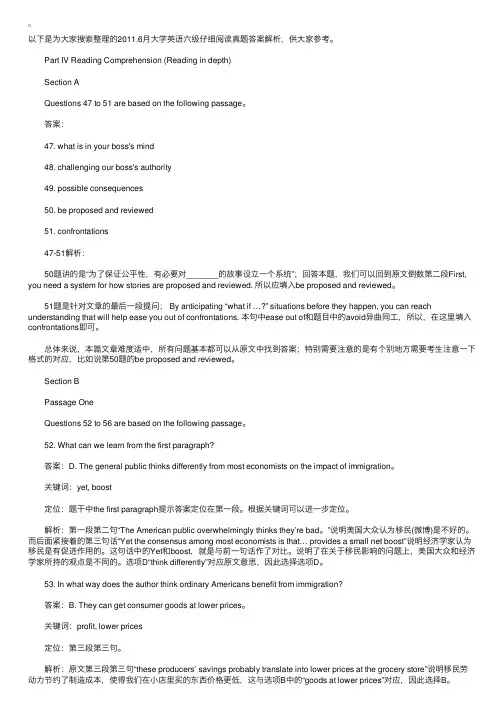
以下是为⼤家搜索整理的2011.6⽉⼤学英语六级仔细阅读真题答案解析,供⼤家参考。
Part IV Reading Comprehension (Reading in depth) Section A Questions 47 to 51 are based on the following passage。
答案: 47. what is in your boss's mind 48. challenging our boss's authority 49. possible consequences 50. be proposed and reviewed 51. confrontations 47-51解析: 50题讲的是“为了保证公平性,有必要对_______的故事设⽴⼀个系统”;回答本题,我们可以回到原⽂倒数第⼆段First, you need a system for how stories are proposed and reviewed. 所以应填⼊be proposed and reviewed。
51题是针对⽂章的最后⼀段提问; By anticipating “what if …?” situations before they happen, you can reach understanding that will help ease you out of confrontations. 本句中ease out of和题⽬中的avoid异曲同⼯,所以,在这⾥填⼊confrontations即可。
总体来说,本篇⽂章难度适中,所有问题基本都可以从原⽂中找到答案;特别需要注意的是有个别地⽅需要考⽣注意⼀下格式的对应,⽐如说第50题的be proposed and reviewed。
Section B Passage One Questions 52 to 56 are based on the following passage。
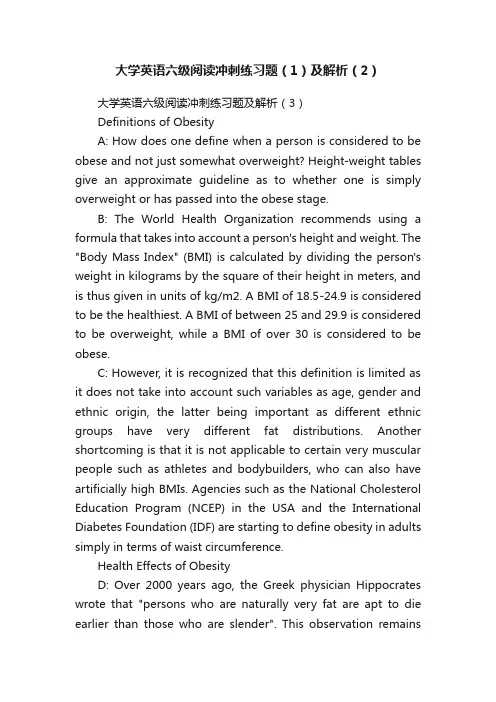
大学英语六级阅读冲刺练习题(1)及解析(2)大学英语六级阅读冲刺练习题及解析(3)Definitions of ObesityA: How does one define when a person is considered to be obese and not just somewhat overweight? Height-weight tables give an approximate guideline as to whether one is simply overweight or has passed into the obese stage.B: The World Health Organization recommends using a formula that takes into account a person's height and weight. The "Body Mass Index" (BMI) is calculated by dividing the person's weight in kilograms by the square of their height in meters, and is thus given in units of kg/m2. A BMI of 18.5-24.9 is considered to be the healthiest. A BMI of between 25 and 29.9 is considered to be overweight, while a BMI of over 30 is considered to be obese.C: However, it is recognized that this definition is limited as it does not take into account such variables as age, gender and ethnic origin, the latter being important as different ethnic groups have very different fat distributions. Another shortcoming is that it is not applicable to certain very muscular people such as athletes and bodybuilders, who can also have artificially high BMIs. Agencies such as the National Cholesterol Education Program (NCEP) in the USA and the International Diabetes Foundation (IDF) are starting to define obesity in adults simply in terms of waist circumference.Health Effects of ObesityD: Over 2000 years ago, the Greek physician Hippocrates wrote that "persons who are naturally very fat are apt to die earlier than those who are slender". This observation remainsvery true today. Obesity has a major impact on a person's physical, social and emotional well-being. It increases the risk of developing diabetes mellitus type 2 ("mature onset diabetes") and also makes Type 2 diabetes more difficult to control. Thus weight loss improves the levels of blood glucose and blood fats, and reduces blood pressure. The association between obesity and coronary heart disease is also well-known.CancerE: Furthermore, in 2001 medical researchers established a link between being overweight and certain forms of cancer, and estimated that nearly 10,000 Britons per year develop cancer as a result of being overweight. This figure was made up of 5,893 women and 3,220 men, with the strongest associations being with breast and colon cancers. However, it is thought that being overweight may also increase the risk of cancer in the reproductive organs for women and in the prostate gland for men.F: The link between breast cancer and nutritional status is thought to be due to the steroid hormones oestrogen and progesterone, which are produced by the ovaries, and govern a woman's menstrual cycle. Researchers have found that the more a woman eats, or the more sedentary her lifestyle, the higher are the concentrations of progesterone. This link could explain why women from less affluent countries have lower rates of breast cancer. Women from less affluent nations tend to eat less food and to lead lifestyles which involve more daily movement. This lowers their progesterone level, resulting in lower predisposition to breast cancer.G: The Times newspaper, in 2002 reported that obesity was the main avoidable cause of cancer among non-smokers in theWestern world!AgingH: Research published by St Thomas' Hospital, London, UK in 2005 showed a correlation between body fat and aging, to the extent that being obese added 8.8 years to a woman's biological age. The effect was exacerbated by smoking, and a non-overweight woman who smokes 20 cigarettes a day for 20 years added 7.4 years to their biological age. The combination of being obese and a smoker added at least ten years to a woman’s biological age, and although the study only involved women, the lead researcher Professor Tim Spector believes the finding would also apply to men.I: The aging effect was determined by measuring the length of telomeres, tiny "caps" on the ends of chromosomes, which help protect the DNA from the ageing process. Indeed, telomeres have been dubbed the "chromosomal clock" because, as an organism ages, they become progressively shorter, and can be used to determine the age of the organism. Beyond a certain point, the telomere becomes so short that it is no longer able to prevent the DNA of the chromosome from falling apart. It is believed that excess body fat, and the chemicals present in tobacco smoke release free radicals which trigger inflammation. Inflammation causes the production of white blood cells which increases the rate of erosion of telomeres.DementiaJ: Recent research (2005) conducted in the USA shows that obesity in middle age is linked to an increased risk of dementia, with obese people in their 40s being 74% more likely to develop dementia compared to those of normal weight. For those who are merely overweight, the lifetime risk of dementia risk was 35%higher.K: Scientists from the Aging Research Centre at the Karolinska Institute in Sweden have been able to take information such as age, number of years in education, gender, body mass index, blood pressure level, physical activity and genetic factors, assigning each a risk score. They then used this information to devise a predictive test for dementia. This test will enable people at risk, for the first time, to be able to affect lifestyle changes which will reduce their risk of contracting dementia.Other ProblemsL: The world-wide upsurge in obesity, particularly in children, is of major economic concern, liable to drain economies. Of further concern is that research conducted in Australia and published in 2006, shows that up to one third of breech pregnancies were undetected by the traditional "palpation" examination, the danger being greatest for those women who are overweight or obese—a growing proportion of mothers. This means that such women are not getting the treatment required to turn the baby around in time for the birth, and in many cases require an emergency Caesarean section.M: This is a true health-care crisis, far bigger than Severe Acute Respiratory Syndrome (SARS) and ultimately, even bigger than AIDS.1. You can judge whether one is simply overweight or has passed into the obese stage according to the height-weight table.2. Using the "Body Mass Index"to define a person's weight ideal is limited, because it does not takes into account many variables such as age, gender and ethnic origin.3. A person's emotional well-being would be affected by obesity.4. Obesity has something to do with cancer in the prostate gland for man.5. Women from less affluent nations tend to have much less breast cancer.6. A non-overweight woman who smokes 20 cigarettes a day for 20 years added7.4 years to her biological age.7. The excess body fat, like the chemicals present in tobacco smoke, can lead to inflammation.8. Obese people in middle age run an increased risk of dementia .9. The predictive test for dementia will help people to affect lifestyle changes that will reduce their risk of contracting dementia.10. The world-wide upsurge in obesity, particularly in children, will possibly drain economies.答案 1. A 2. C 3. D 4. E 5. F 6. H7. I8. J9. K10. L。
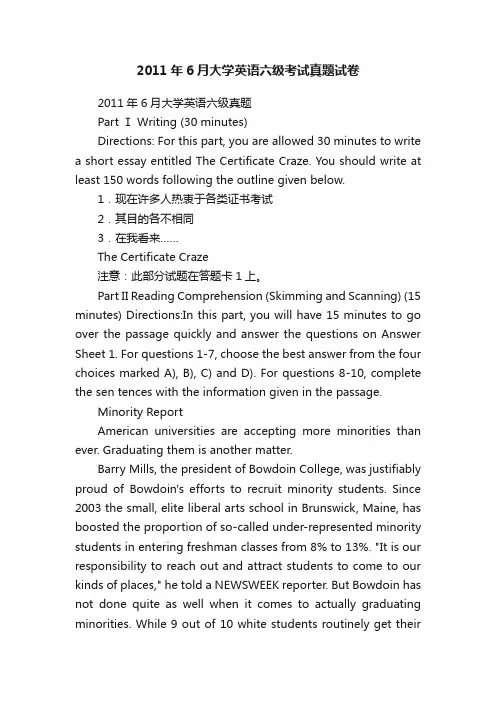
2011年6月大学英语六级考试真题试卷2011年6月大学英语六级真题Part Ⅰ Writing (30 minutes)Directions: For this part, you are allowed 30 minutes to write a short essay entitled The Certificate Craze. You should write at least 150 words following the outline given below.1.现在许多人热衷于各类证书考试2.其目的各不相同3.在我看来……The Certificate Craze注意:此部分试题在答题卡1上。
Part II Reading Comprehension (Skimming and Scanning) (15 minutes) Directions:In this part, you will have 15 minutes to go over the passage quickly and answer the questions on Answer Sheet 1. For questions 1-7, choose the best answer from the four choices marked A), B), C) and D). For questions 8-10, complete the sen tences with the information given in the passage.Minority ReportAmerican universities are accepting more minorities than ever. Graduating them is another matter.Barry Mills, the president of Bowdoin College, was justifiably proud of Bowdoin's efforts to recruit minority students. Since 2003 the small, elite liberal arts school in Brunswick, Maine, has boosted the proportion of so-called under-represented minority students in entering freshman classes from 8% to 13%. "It is our responsibility to reach out and attract students to come to our kinds of places," he told a NEWSWEEK reporter. But Bowdoin has not done quite as well when it comes to actually graduating minorities. While 9 out of 10 white students routinely get theirdiplomas within six years, only 7 out of 10 black students made it to graduation day in several recent classes."If you look at who enters college, it now looks like America," says Hilary Pennington, director of postsecondary programs for the Bill & Melinda Gates Foundation, which has closely studied enrollment patterns in higher education. "But if you look at who walks across the stage for a diploma, it's still largely the white, upper-income population."The United States once had the highest graduation rate of any nation. Now it stands 10th. For the first time in American history, there is the risk that the rising generation will be less well educated than the previous one. The graduation rate among 25- to 34-year-olds is no better than the rate for the 55- to 64-year-olds who were going to college more than 30 years ago. Studies show that more and more poor and non-white students want to graduate from college – but their graduation rates fall far short of their dreams. The graduation rates for blacks, Latinos, and Native Americans lag far behind the graduation rates for whites and Asians. As the minority population grows in the United States, low college graduation rates become a threat to national prosperity.The problem is pronounced at public universities. In 2007 the University of Wisconsin-Madison –one of the top five or so prestigious public universities –graduated 81% of its white students within six years, but only 56% of its blacks. At less-selective state schools, the numbers get worse. During the same time frame, the University of Northern Iowa graduated 67% of its white students,but only 39% of its blacks. Community colleges have low graduation rates generally – butrock-bottom rates for minorities. A recent review of California community colleges found that while a third of the Asian students picked up their degrees, only 15% of African-Americans did so as well.Private colleges and universities generally do better, partly because they offer smaller classes and more personal attention. But when it comes to a significant graduation gap, Bowdoin has company. Nearby Colby College logged an 18-point difference between white and black graduates in 2007 and 25 points in 2006. Middlebury College in Vermont, another top school, had a 19-point gap in 2007 and a 22-point gap in 2006. The most selective private schools – Harvard, Yale, and Princeton – show almost no gap between black and white graduation rates. But that may have more to do with their ability to select the best students. According to data gathered by Harvard Law School professor Lani Guinier, the most selective schools are more likely to choose blacks who have at least one immigrant parent from Africa or the Caribbean than black students who are descendants of American slaves."Higher education has been able to duck this issue for years, particularly the more selective schools, by saying the responsibility is on the individual student," says Pennington of the Gates Foundation. "If they fail, it's their fault." Some critics blame affirmative action –students admitted with lower test scores and grades from shaky high schools often struggle at elite schools. But a bigger problem may be that poor high schools often send their students to colleges for which they are "undermatched": they could get into more elite, richer schools, but instead go to community colleges and low-rated state schools that lack the resources to help them. Some schools outfor profit cynically increase tuitions and count on student loans and federal aid to foot the bill –knowing full well that the students won't make it. "The school keeps the money, but the kid leaves with loads of debt and no degree and no ability to get a better job. Colleges are not holding up their end," says Amy Wilkins of the Education Trust.A college education is getting ever more expensive. Since 1982 tuitions have been rising at roughly twice the rate of inflation. In 2008 the net cost of attending a four-year public university –after financial aid –equaled 28% of median (中间的)family income, while a four-year private university cost 76% of median family income. More and more scholarships are based on merit, not need. Poorer students are not always the best-informed consumers. Often they wind up deeply in debt or simply unable to pay after a year or two and must drop out.There once was a time when universities took pride in their dropout rates. Professors would begin the year by saying, "Look to the right and look to the left. One of you is not going to be here by the end of the year." But such a Darwinian spirit is beginning to give way as at least a few colleges face up to the graduation gap. At the University of Wisconsin-Madison, the gap has been roughly halved over the last three years. The university has poured resources into peer counseling to help students from inner-city schools adjust to the rigor (严格要求)and faster pace of a university classroom –and also to help minority students overcome the stereotype that they are less qualified. Wisconsin has a "laserlike focus" on building up student skills in the first three months, according to vice provost (教务长)Damon Williams.State and federal governments could sharpen that focus everywhere by broadly publishing minority graduation rates. Foryears private colleges such as Princeton and MIT have had success bringing minorities onto campus in the summer before freshman year to give them some prepara tory courses. The newer trend is to start recruiting poor and non-white students as early as theseventh grade, using innovative tools to identify kids with sophisticated verbal skills. Such pro grams can be expensive, of course, but cheap compared with the millions already invested in scholarships and grants for kids who have little chance to graduate without special support.With effort and money, the graduation gap can be closed. Washington and Lee is a small, selective school in Lexington, Va. Its student body is less than 5% black and less than 2% Latino. While the school usually graduated about 90% of its whites, the graduation rate of its blacks and Latinos had dipped to 63% by 2007. "We went through a dramatic shift," says Dawn Watkins, the vice president for student affairs. The school aggressively pushed mentoring (辅导) of minorities by other students and "partnering" with parents at a special pre-enrollment session. The school had its first-ever black homecoming. Last spring the school graduated the same proportion of minorities as it did whites. If the United States wants to keep up in the global economic race, it will have to pay systematic attention to graduating minorities, not just enrolling them.注意:此部分试题请在答题卡1上作答。

2011年英语六级考试(CET6)全真模拟试卷(4)总分:710分及格:426分考试时间:140分Part I Writing(1)Directions: For this part, you are allowed 30 minutes to write a short essay entitled A Talk on How to Do Well in CET-4 at least 150 words following the outline given below:Part II Reading Comprehension快速阅读 单选题(1)根据下列文章,回答{TSE}题(2)Why is only a small amount of ocean water desalinated in the world?(3)What is one of the main causes of most diseases according to the World Bank?(4)In underdeveloped countries, thousands of children die as a result of __________ every day.(5)To relieve water crisis in lesser developed countries, each region is expected to __________.(6)What is the Year 2025 forecast mainly concerned about?(7)How can individuals in developed countries realistically contribute to the solution of water crisis?快速阅读填空题(1)According to global experiences, __________ is one of the keys to the management of wate crisis.(2)For the management of transboundary water sources, __________is a potential way.(3)The water agreement negotiated in the Jordan River Basin reflected that a paradigm __________ is more effective.Listening Comprehension (35 minutes)听力选择题(1)点击按钮播放听力音频>>{MP3:/examfiles/2012/listenfiles/2011cet6/04.mp3}<ahref="javascript:;"></a>(2)<Ahref="javascript:;"></A>(3)<Ahref="javascript:;"></A>(4)<Ahref="javascript:;"></A>(5)<Ahref="javascript:;"></A>(6)<Ahref="javascript:;"></A>(7)<Ahref="javascript:;"></A>(8)<Ahref="javascript:;"></A> (9)Questions {TSE} are based on the conversation you have just heard.(10)<Ahref="javascript:;"></A> (11)<Ahref="javascript:;"></A>(12)<A href="javascript:;"></A>Questions {TSE} are based on the conversation you have just heard.(13)<Ahref="javascript:;"></A>(14)<Ahref="javascript:;"></A>(15)<Ahref="javascript:;"></A>(16)Questions {TSE} are based on the passage you have just heard.(17)<Ahref="javascript:;"></ A>(18)<Ahref="javascript:;"></A >(19)Questions {TSE} are based on the passage you have just heard.(20)<Ahref="javascript:;"></A>(21)<Ahref="javascript:;"></A>(22)Questions {TSE} are based on the passage you have just heard.(23)<Ahref="javascript:;"></A>(24)<Ahref="javascript:;"></A>(25)<Ahref="javascript:;"></A>听力填空题(1)根据所听到的内容,填充以下空缺部分。
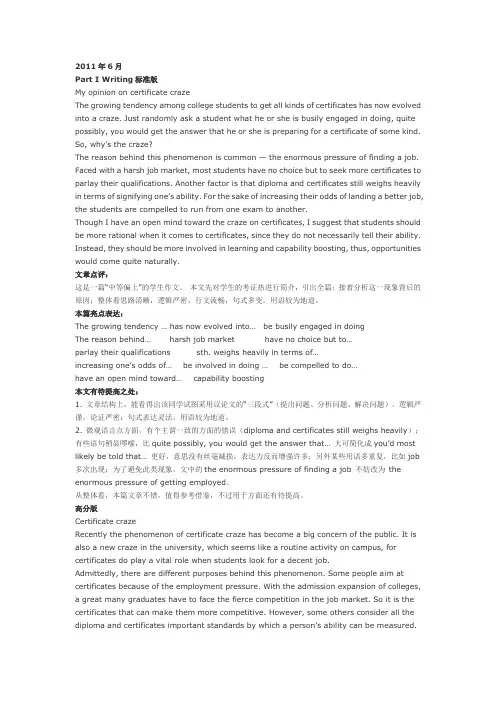
2011年6月Part I Writing标准版My opinion on certificate crazeThe growing tendency among college students to get all kinds of certificates has now evolved into a craze. Just randomly ask a student what he or she is busily engaged in doing, quite possibly, you would get the answer that he or she is preparing for a certificate of some kind. So, why‟s the craze?The reason behind this phenomenon is common — the enormous pressure of finding a job. Faced with a harsh job market, most students have no choice but to seek more certificates to parlay their qualifications. Another factor is that diploma and certificates still weighs heavily in terms of signifying one‟s ability. For the sake of increasing their odds of landing a better job, the students are compelled to run from one exam to another.Though I have an open mind toward the craze on certificates, I suggest that students should be more rational when it comes to certificates, since they do not necessarily tell their ability. Instead, they should be more involved in learning and capability boosting, thus, opportunities would come quite naturally.文章点评:这是一篇“中等偏上”的学生作文。
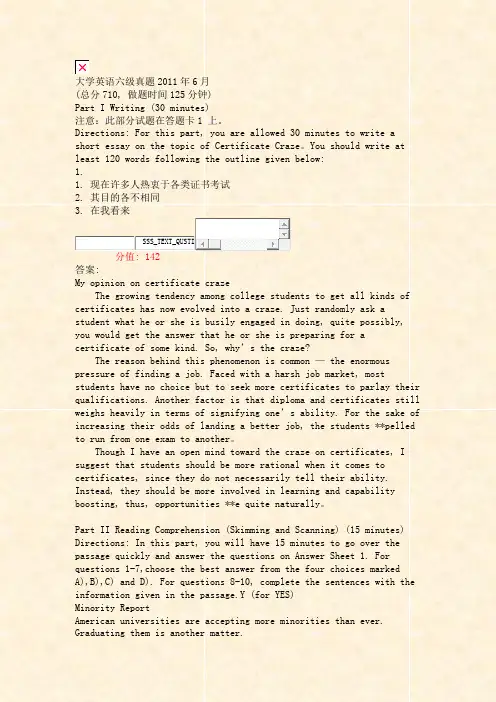
大学英语六级真题2011年6月(总分710, 做题时间125分钟)Part I Writing (30 minutes)注意:此部分试题在答题卡1 上。
Directions: For this part, you are allowed 30 minutes to write a short essay on the topic of Certificate Craze。
You should write at least 120 words following the outline given below:1.1. 现在许多人热衷于各类证书考试2. 其目的各不相同3. 在我看来SSS_TEXT_QUSTI分值: 142答案:My opinion on certificate crazeThe growing tendency among college students to get all kinds of certificates has now evolved into a craze. Just randomly ask a student what he or she is busily engaged in doing, quite possibly, you would get the answer that he or she is preparing for acertificate of some kind. So, why’s the craze?The reason behind this phenomenon is common — the enormous pressure of finding a job. Faced with a harsh job market, most students have no choice but to seek more certificates to parlay their qualifications. Another factor is that diploma and certificates still weighs heavily in te rms of signifying one’s ability. For the sake of increasing their odds of landing a better job, the students **pelled to run from one exam to another。
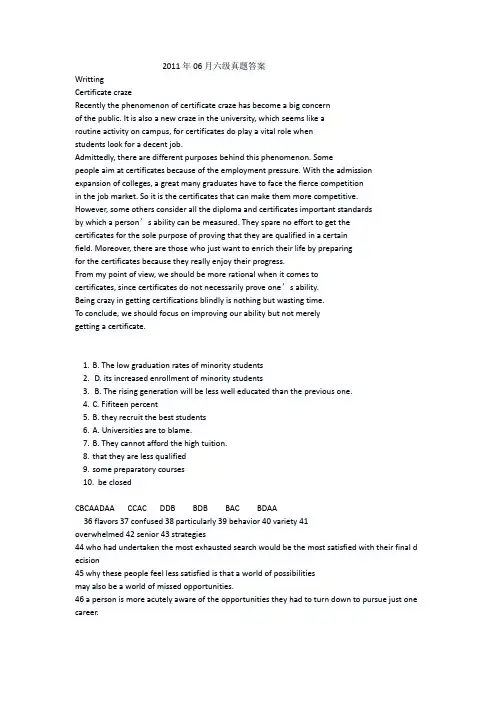
2011年06月六级真题答案WrittingCertificate crazeRecently the phenomenon of certificate craze has become a big concernof the public. It is also a new craze in the university, which seems like aroutine activity on campus, for certificates do play a vital role whenstudents look for a decent job.Admittedly, there are different purposes behind this phenomenon. Somepeople aim at certificates because of the employment pressure. With the admission expansion of colleges, a great many graduates have to face the fierce competitionin the job market. So it is the certificates that can make them more competitive.However, some others consider all the diploma and certificates important standardsby which a person’s ability can be measured. They spare no effort to get thecertificates for the sole purpose of proving that they are qualified in a certainfield. Moreover, there are those who just want to enrich their life by preparingfor the certificates because they really enjoy their progress.From my point of view, we should be more rational when it comes tocertificates, since certificates do not necessarily prove one’s ability.Being crazy in getting certifications blindly is nothing but wasting time.To conclude, we should focus on improving our ability but not merelygetting a certificate.1.B. The low graduation rates of minority students2. D. its increased enrollment of minority students3. B. The rising generation will be less well educated than the previous one.4.C. Fifiteen percent5.B. they recruit the best students6.A. Universities are to blame.7.B. They cannot afford the high tuition.8.that they are less qualified9.some preparatory courses10.be closedCBCAADAA CCAC DDB BDB BAC BDAA36 flavors 37 confused 38 particularly 39 behavior 40 variety 41overwhelmed 42 senior 43 strategies44 who had undertaken the most exhausted search would be the most satisfied with their final d ecision45 why these people feel less satisfied is that a world of possibilitiesmay also be a world of missed opportunities.46 a person is more acutely aware of the opportunities they had to turn down to pursue just one career.47. what is in your boss's mind48. challenging our boss's authority49. possible consequences50. be proposed and reviewed51. ConfrontationsDBCDC ABCCD62 employers63 but64 devote65competitive66 academic67 necessarily68 outside69 demanding70 potential71 relevant72 up73 voluntary74 and75 Exceptional76 perform77 formally78 For instance79 demonstrated80 scheme81 peers82. Even though they were already late, they would rather stop for the beautiful view(宁愿停下来欣赏美丽的景色) than just go on.83. No agreement was reached in the discussion between the two parties, as either side refuses t o soften their positions (任何一方都不肯放弃自己的立场)84. The pills could have cured the cancer patient (本来可以治愈那位癌症病人的), but he didn’t follow the doctor’s advice and take them regularly.85. It is really kind of you to give me so much help(你真好,给了我那么多帮助);I really feel obliged to you.86. The war left the family scattered all over the world, and it was thirty years before they were a ble to reunite(他们才得以重聚)P。
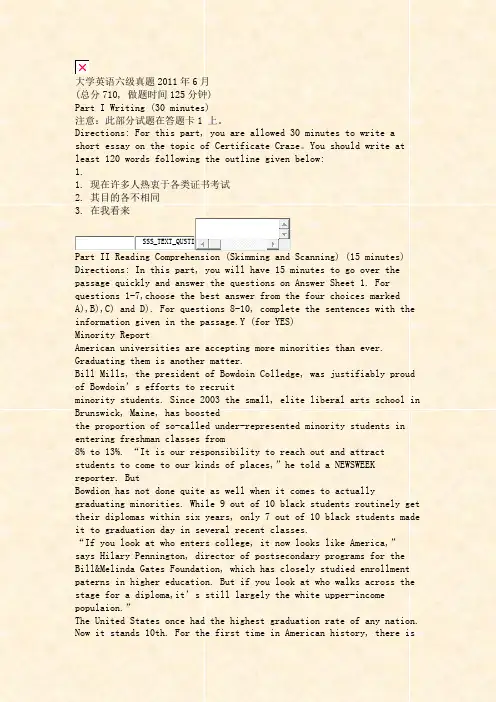
大学英语六级真题2011年6月(总分710, 做题时间125分钟)Part I Writing (30 minutes)注意:此部分试题在答题卡1 上。
Directions: For this part, you are allowed 30 minutes to write a short essay on the topic of Certificate Craze。
You should write at least 120 words following the outline given below:1.1. 现在许多人热衷于各类证书考试2. 其目的各不相同3. 在我看来SSS_TEXT_QUSTIPart II Reading Comprehension (Skimming and Scanning) (15 minutes) Directions: In this part, you will have 15 minutes to go over the passage quickly and answer the questions on Answer Sheet 1. For questions 1-7,choose the best answer from the four choices marked A),B),C) and D). For questions 8-10, complete the sentences with the information given in the passage.Y (for YES)Minority ReportAmerican universities are accepting more minorities than ever. Graduating them is another matter.Bill Mills, the president of Bowdoin Colledge, was justifiably proud of Bowdoin’s efforts to recruitminority students. Since 2003 the small, elite liberal arts school in Brunswick, Maine, has boostedthe proportion of so-called under-represented minority students in entering freshman classes from8% to 13%. “It is our responsibility to reach out and attract students to come to our kinds of plac es,”he told a NEWSWEEK reporter. ButBowdion has not done quite as well when it comes to actually graduating minorities. While 9 out of 10 black students routinely get their diplomas within six years, only 7 out of 10 black students made it to graduation day in several recent classes.“If you look at who enters college, it now looks like America,” says Hilary Pennington, director of postsecondary programs for the Bill&Melinda Gates Foundation, which has closely studied enrollment paterns in higher education. But if you look at who walks across the stage for a diploma,it’s still largely the white upper-income populaion.”The United States once had the highest graduation rate of any nation. Now it stands 10th. For the first time in American history, there isthe risk that the rising generation will be less well educated than the previous one. The graduation rate among 25- to 34-year-olds is no better than the rate for the 55-to 64-year-olds who were going to college more than 30 years ago. Studies show that more and more poor and non-white students want to graduate from college-but their graduation rated fall far short of their dreams. The graduation rates for whites and Asians. As the minority population grows in the United States, low college graduation rates become a threat to national prosperity.The problem is pronounced at public universities. In 2007 the University of Wisconsin-Madison-one of the top five or so prestigious public universties-graduated 81% of its white students within six years, but only 56% of its blacks. At less-selective state schools, the numbers get worse. During the same time frame, the University of Northern lowa graduated 67% of its white students, but only 39% ofits blacks. Community colleges have low graduation rates generally-but rockbottom rates for minorities. A recent review of **munity colleges found that while a third of the Asian students picked up their degrees, only 15% of African Americans did so as well.Private colleges and universities generally do better, partly because they offer smaller classes and more personal attention. But when it comes to a significant graduation gap, Bowdoin **pany. Nearby Colby College logged an 18-point difference between white and black graduates in 2007 and 25 points in 2006. Middlebury College in Vermont, another top school, had a 19-point gap in 2007 and a 22-points in 2006. The most selective private schools-Harvard, Yale, and Princeton show almost no gap between black and white gradation rates. But that may have more to do with their ability to select the best students. According to data gathered by Harvard Law School professor Lani Guinier, the most selective schools are more likely to choose blacks who have at least one immigrant parent from Africa or the Caribbean than black students who are descendants of American slaves. “Higher education has been able to duck this issue for years, paticularly the more selective schools,by saying the responsibilityis on the individual student,” says Pennington of the Gates Foundation.” If they fail,it’s their fault.” Some critics blame afformative action-students admitted with lower test scores and grades from shaky high schools often struggle at elite schools. But a bigger problem may be that poorhigh schools often send their students to colleges f or which they are “undermatched”,they could get into more elite, richer schoold, but instedad go to community colleges and low-rated state schools that lack the resources to help them. Some schools out for profit cynically increase tuitions and count on student loans and federal aid to foot the bill-knowing full well thatthe students won’t make it. “ The school keeps the money, but the kid leaves with loads of debt and no degree and no ability to get a better job. College are not holding up their end,” say s Amy Wilkins of the Education Trust.A college education is getting ever more expensive, Since 1982 tuitions have been rising at roughly twice the rate of inflation. In 2008 the net cost of attending a four-year public university-after financial aid-equaled 28% of median (中间的) family income, while a four-year private university cost 76% of median family income. More and more scholarships are based on merit, not need. Poorer students are not always the best-informed cunsumers. Often they wind up deeply in debt or simply unable to pay after a year or two and must drop out.There once was a time when universities took pride in their dropout rates. Professors would begin the year by saying ,”Look to the right and look to the left. One of you is not going to be here by theend of the year.” But such a Darwinian spirit is beginning to give way as at least a few colleges face up to the graduation gap. At the university of Wisconsin Madison, the gap has beeen roughly halved over the last three years. The university had poured resources into peer counseling to help students from inner-city schools adjust to the rigor(严格要求) and faster pace of a university classroon-and also to help minority students **e the stereotype that they are less qualified. Wisconsin has a “laserlike focus” on building up student skills in the first three months, according to vice provost (教务长)Damon Williams.State and federal governments could sharpen that focus everywhere by broadly publishing minority graduation rates. For years private colleges such as Princeton and MIT have has success bringing minorities onto campus in the summer before freshman year to give them some preparatory courses.The newer trend is to start recruiting poor and no-white students as early as the seventy grade, using innovative tools to identify kids with sophisticated verbal skills. Such programs can be expensive,of course but **pared with themillions already invested in scholarships and grants for kids who have little chance to graduate without special support.With efforts and money, the graduation gap can be closed. Washington and Lee is a small, selective school in Lexington.Va. Its student body is less than 5% black and less than 2% Latino. While the school usually graduated about 90% of its whites, the graduation rate of its blacks and Latinos had dipped to 63% by 2007. “We went through a dramatic shift,” says Dawn watkins the vice president for student affairs. The school aggressively pushed mentoring of minorities by other students and “partnering” with parents at a special pre-enrollment session. The school had its first-ever black **ing. Last spring the school graduated the same proportion of minorities as it did whites. If the United States wants to keep up in the global economic race, it will have to pay systematic attention to graduating manorities, not just enrolling them.SSS_SINGLE_SEL1.What is the author’s main concern about American higher education?A The small proportion of minority students.B The low graduation rates of minority students.C The growing conflicts among ethnic groups.D The poor academic performance of students.SSS_SINGLE_SEL2.What was the pride of President Barry Mills of Bowdoin College?A The prestige of its liberal arts programs.B Its ranking among universities in Maine.C The high graduation rates of its students.D Its increased enrollment of minority students.SSS_SINGLE_SEL3.What is the risk facing America?A Its schools will be overwhelmed by the growing number ofillegal immigrants.B The rising generation will be less well educated than the previous one.C More poor and non-white students will be denied access to college.D It is going to lose **petitive edge in higher education.SSS_SINGLE_SEL4.How many African-American students earned their degrees in **munity colleges according to a recent review?A Fifty-six percent.B Thirty-nine percent.C Fifteen percent.D Sixty-seven percent.SSS_SINGLE_SEL5.Harvard, Yale, and Princeton show almost no gap between black and white graduation rates mainly because________.A their students work harderB they recruit the best studentsC their classes are generally smallerD they give students more attentionSSS_SINGLE_SEL6.How does Amy Wilkins of the Education Trust view minority students’ failure to get a degree?A Universities are to blame.B Students don’t work hard.C The government fails to provide the necessary support.D Affirmative action should be held responsibleSSS_SINGLE_SEL7.Why do some students drop out after a year or two according to the author?A They have lost confidence in themselves.B They cannot afford the high tuition.C They cannot adapt to the rigor of the school.D They fail to develop interest in their studies.SSS_FILL8.To tackle the problem of graduation gap, the University of Wisconsin-Madison helps minority students get over the stereotype that ____.SSS_FILL9.For years, private colleges such as Princeton and MIT have provided minority students with ___during the summer before freshman year.SSS_FILL10.Washington and Lee University is cited as an example to show that the gap of graduation ratesd between whites and minorities can _____.Part III Listening Comprehension (35 minutes)Section ADirections: In this section, you will hear 8 short conversations and 2 long conversations. At the end of each conversation, one or more questions will be asked about what was said.Both the conversation and the questions will be spoken only once. After each question therewill be a pause. During the pause, you must read the four choices marked A), B),C) and D), and decide which is the best answer. Then mark the corresponding letter on Answer Sheet 2 with a single line through the centre.SSS_SINGLE_SEL11.A She will give him the receipt later.B The man should make his own copies.C She has not got the man’s copies ready.D The man forgot to make the copies for her.SSS_SINGLE_SEL12.A She phoned Fred about the book.B She was late for the appointment.C She ran into Fred on her way here.D She often keeps other people waiting.SSS_SINGLE_SEL13.A Mark is not fit to take charge of the Student Union.B Mark is the best candidate for the post of chairman.C It won’t be easy for Mark to win the election.D Females are **petitive than males in electionsSSS_SINGLE_SEL14.A It failed to arrive at its destination in time.B It got seriously damaged on the way.C It got lost at the airport in Paris.D It was left behind in the hotelSSS_SINGLE_SEL15.A Just make use of whatever information is available.B Put more effort into preparing for the presentation.C Find more relevant information for their work.D Simply raise the issue in their presentation.SSS_SINGLE_SEL16.A The man has decided to choose Language Studies as his major.B The woman isn’t interested in the psychology of language.C The man is still trying to sign up for the course he is interested in.D The woman isn’t qualified to ta ke the course the man mentioned.SSS_SINGLE_SEL17.A They are both to blame.B They are both easy to please.C They can manage to get along.D They will make peace in timeSSS_SINGLE_SEL18.A They are in desperate need of financial assistance.B They hope to do miracles with limited resources.C They want to borrow a huge sum from the bank.D They plan to buy out their business partnersQuestions 19 to 21 are based on the conversation you have just heard.SSS_SINGLE_SEL19.A We simply cannot help reacting instinctively that way.B We wish to hide our indifference to their misfortune.C We derive some humorous satisfaction from their misfortune.D We think it serves them right for being mean to other peopleSSS_SINGLE_SEL20.A They want to show their genuine sympathy.B They have had similar personal experiences.C They don’t know how to cope with the situation.D They don’t want to reveal their own frustration.SSS_SINGLE_SEL21.A They themselves would like to do it but don’t dare to.B It’s an opportunity for relieving their tension.C It’s a rare chance for them to see the boss lose face.D They have seen this many times in old films.SSS_SINGLE_SEL22.A To irritate them.B To teach them a lesson.C To relieve her feelings.D To show her courage.Questions 23 to 25 are based on the conversation you have just heard.SSS_SINGLE_SEL23.A Smuggling drugs into Hong Kong.B **mitted armed robbery.C Stealing a fellow passenger’s bag.D Bringing a handgun into Hong Kong.SSS_SINGLE_SEL24.A He said not a single word during the entire flight.B He took away Kumar’s baggage while he was asleep.C He was travelling on a scholarship from Delhi University.D He is suspected of having slipped something in Kumar’s bag.SSS_SINGLE_SEL25.A Give him a lift.B Find Alfred Foster.C Check the passenger list.D Search all suspicious cars.Section BDirections: In this section, you will hear 3 short passages. At the end of each passage, you will hear some questions. Both the passage and the questions will be spoken only once.After you hear a question, you must choose the best answer from the four choices marked A), B), C) and D). Then mark the corresponding letter on Answer Sheet 2 with a single line through the centre.注意:此部分试题请在答题卡2 上作答。
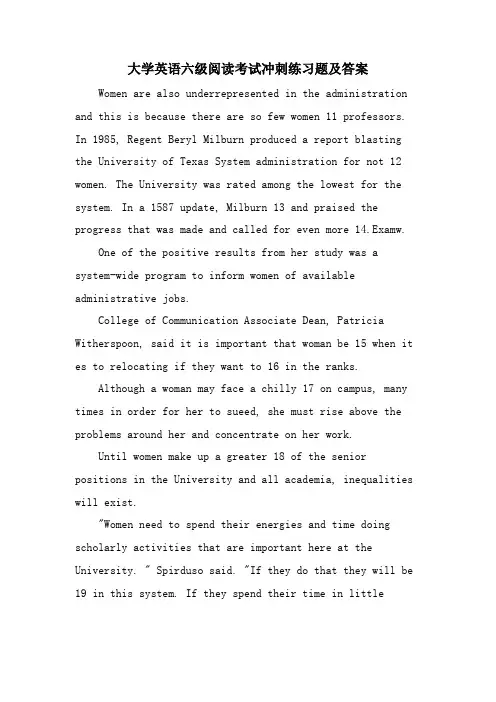
大学英语六级阅读考试冲刺练习题及答案Women are also underrepresented in the administration and this is because there are so few women 11 professors. In 1985, Regent Beryl Milburn produced a report blasting the University of Texas System administration for not 12 women. The University was rated among the lowest for the system. In a 1587 update, Milburn 13 and praised the progress that was made and called for even more 14.Examw.One of the positive results from her study was a system-wide program to inform women of available administrative jobs.College of Communication Associate Dean, Patricia Witherspoon, said it is important that woman be 15 when it es to relocating if they want to 16 in the ranks.Although a woman may face a chilly 17 on campus, many times in order for her to sueed, she must rise above the problems around her and concentrate on her work.Until women make up a greater 18 of the senior positions in the University and all academia, inequalities will exist."Women need to spend their energies and time doing scholarly activities that are important here at the University. " Spirduso said. "If they do that they will be 19 in this system. If they spend their time in littlegroups mourning the sexual discrimination that they think exists here, they are 20 wasting valuable study time. "A. fullB. recalledC. improvementD. riseE. encouragingF. flexibleG. recognizedH. idlyI. ratioJ. persuadingK. movableL. possiblyM. suessfulN. climateO. percentage11. A 12. E 13. G 14. C 15. F 16. D 17. N 18. O 19. M 20. H。
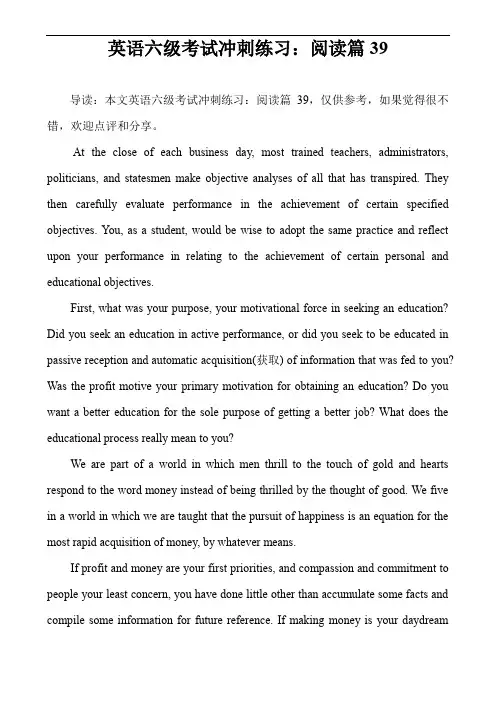
英语六级考试冲刺练习:阅读篇39 导读:本文英语六级考试冲刺练习:阅读篇39,仅供参考,如果觉得很不错,欢迎点评和分享。 At the close of each business day, most trained teachers, administrators, politicians, and statesmen make objective analyses of all that has transpired. They then carefully evaluate performance in the achievement of certain specified objectives. You, as a student, would be wise to adopt the same practice and reflect upon your performance in relating to the achievement of certain personal and educational objectives. First, what was your purpose, your motivational force in seeking an education? Did you seek an education in active performance, or did you seek to be educated in passive reception and automatic acquisition(获取) of information that was fed to you? Was the profit motive your primary motivation for obtaining an education? Do you want a better education for the sole purpose of getting a better job? What does the educational process really mean to you? We are part of a world in which men thrill to the touch of gold and hearts respond to the word money instead of being thrilled by the thought of good. We five in a world in which we are taught that the pursuit of happiness is an equation for the most rapid acquisition of money, by whatever means. If profit and money are your first priorities, and compassion and commitment to people your least concern, you have done little other than accumulate some facts and compile some information for future reference. If making money is your daydream and losing money your nightmare, if poverty is your worst fear and making money your most fervent prayer, you have missed the opportunity for education. You have failed yourself and have only received Nome instruction. 21.. This passage suggests that students should______. A. assess their aims for learning B. learn more to earn more C. evaluate their politicians and statesmen D. keep knowledge to themselves 22.The educational procedure should be one in which the student______. A. does what he is told B. gets a better education to get a better job C. makes principles of education for self-betterment of their aims D. approaches the benefits of being well-off 23. The author seems to feel that______. A. people's welfare should be the chief concern in learning B. profit has nothing to do with people C. poverty is good for the soul D. knowledge is not the main objective for learning 24.A good title for the selection might be______. A. The Benefit of Education B. Education Motivation—Progress or Profit C. Self-Education D. Profit and Money 25. The word "nightmare" in the last paragraph is nearest in meaning to_______. A. a very bad dream B. unhappiness C. sleeplessness D. a hazard to your health 21. A 22. C 23. A 24. B 25. A
2011年6月大学英语六级考试真题(word版)Part ⅠWriting (30 minutes) Directions: For this part, you are allowed 30 minutes to write a short essay entitled The Certificate Craze. You should write at least 150 words following the outline given below. 1.现在许多人热衷于各类证书考试2.其目的各不相同3.在我看来……The Certificate Craze注意:此部分试题在答题卡1上。
Part II Reading Comprehension (Skimming and Scanning) (15 minutes)Directions: In this part, you will have 15 minutes to go over the passage quickly and answer the questions on Answer Sheet 1. For questions 1-7, choose the best answer from the four choices marked A), B), C) and D). For questions 8-10, complete the sen tences with the information given in the passage.Minority ReportAmerican universities are accepting more minorities than ever. Graduating them is another matter.Barry Mills, the president of Bowdoin College, was justifiably proud of Bowdoin's efforts to recruit minority students. Since 2003 the small, elite liberal arts school in Brunswick, Maine, has boosted the proportion of so-called under-represented minority students in entering freshman classes from 8% to 13%. "It is our responsibility to reach out and attract students to come to our kinds of places," he told a NEWSWEEK reporter. But Bowdoin has not done quite as well when it comes to actually graduating minorities. While 9 out of 10 white students routinely get their diplomas within six years, only 7 out of 10 black students made it to graduation day in several recent classes."If you look at who enters college, it now looks like America," says Hilary Pennington, director of postsecondary programs for the Bill & Melinda Gates Foundation, which has closely studied enrollment patterns in higher education. "But if you look at who walks across the stage for a diploma, it's still largely the white, upper-income population."The United States once had the highest graduation rate of any nation. Now it stands 10th. For the first time in American history, there is the risk that the rising generation will be less well educated than the previous one. The graduation rate among 25- to 34-year-olds is no better than the rate for the 55- to 64-year-olds who were going to college more than 30 years ago. Studies show that more and more poor and non-white students want to graduate from college –but their graduation rates fall far short of their dreams. The graduation rates for blacks, Latinos, and Native Americans lag far behind the graduation rates for whites and Asians. As the minority population grows in the United States, low college graduation rates become a threat to national prosperity.The problem is pronounced at public universities. In 2007 the University of Wisconsin-Madison – one of the top five or so prestigious public universities – graduated 81% of its white students within six years, but only 56% of its blacks. At less-selective state schools, the numbers get worse. During the same time frame, the University of Northern Iowa graduated 67% of its white students, but only 39% of its blacks. Community colleges have low graduation rates generally –but rock-bottom rates for minorities. Arecent review of California community colleges found that while a third of the Asian students picked up their degrees, only 15% of African-Americans did so as well.Private colleges and universities generally do better, partly because they offer smaller classes and more personal attention. But when it comes to a significant graduation gap, Bowdoin has company. Nearby Colby College logged an 18-point difference between white and black graduates in 2007 and 25 points in 2006. Middlebury College in Vermont, another top school, had a 19-point gap in 2007 and a 22-point gap in 2006. The most selective private schools – Harvard, Yale, and Princeton – show almost no gap between black and white graduation rates. But that may have more to do with their ability to select the best students. According to data gathered by Harvard Law School professor Lani Guinier, the most selective schools are more likely to choose blacks who have at least one immigrant parent from Africa or the Caribbean than black students who are descendants of American slaves."Higher education has been able to duck this issue for years, particularly the more selective schools, by saying the responsibility is on the individual student," says Pennington of the Gates Foundation. "If they fail, it's their fault." Some critics blame affirmative action – students admitted with lower test scores and grades from shaky high schools often struggle at elite schools. But a bigger problem may be that poor high schools often send their students to colleges for which they are "undermatched": they could get into more elite, richer schools, but instead go to community colleges and low-rated state schools that lack the resources to help them. Some schools out for profit cynically increase tuitions and count on student loans and federal aid to foot the bill –knowing full well that the students won't make it. "The school keeps the money, but the kid leaves with loads of debt and no degree and no ability to get a better job. Colleges are not holding up their end," says Amy Wilkins of the Education Trust.A college education is getting ever more expensive. Since 1982 tuitions have been rising at roughly twice the rate of inflation. In 2008 the net cost of attending a four-year public university –after financial aid –equaled 28% of median (中间的)family income, while a four-year private university cost 76% of median family income. More and more scholarships are based on merit, not need. Poorer students are not always the best-informed consumers. Often they wind up deeply in debt or simply unable to pay after a year or two and must drop out.There once was a time when universities took pride in their dropout rates. Professors would begin the year by saying, "Look to the right and look to the left. One of you is not going to be here by the end of the year." But such a Darwinian spirit is beginning to give way as at least a few colleges face up to the graduation gap. At the University of Wisconsin-Madison, the gap has been roughly halved over the last three years. The university has poured resources into peer counseling to help students from inner-city schools adjust to the rigor (严格要求)and faster pace of a university classroom –and also to help minority students overcome the stereotype that they are less qualified. Wisconsin has a "laserlike focus" on building up student skills in the first three months, according to viceprovost (教务长)Damon Williams.State and federal governments could sharpen that focus everywhere by broadly publishing minority graduation rates. For years private colleges such as Princeton andMIT have had success bringing minorities onto campus in the summer before freshman year to give them some prepara tory courses. The newer trend is to start recruiting poor and non-white students as early as the seventh grade, using innovative tools to identify kids with sophisticated verbal skills. Such pro grams can be expensive, of course, but cheap compared with the millions already invested in scholarships and grants for kids who have little chance to graduate without special support.With effort and money, the graduation gap can be closed. Washington and Lee is a small, selective school in Lexington, Va. Its student body is less than 5% black and less than 2% Latino. While the school usually graduated about 90% of its whites, the graduation rate of its blacks and Latinos had dipped to 63% by 2007. "We went through a dramatic shift," says Dawn Watkins, the vice president for student affairs. The school aggressively pushed mentoring (辅导) of minorities by other students and "partnering" with parents at a special pre-enrollment session. The school had its first-ever black homecoming. Last spring the school graduated the same proportion of minorities as it did whites. If the United States wants to keep up in the global economic race, it will have to pay systematic attention to graduating minorities, not just enrolling them.注意:此部分试题请在答题卡1上作答。
2011年6月大学英语四级真题PartI Writing(30 minutes)Directions: For this part, you are allowed 30 minutes to write a short essay on the topic of Online Shopping. You should write at least 120 words following the outline given below:1.现在网上购物已成为一种时尚2.网上购物有很多好处,但也有不少问题3.我的建议Online Shopping注意:此部分试题在答题卡1上。
Part II Reading Comprehension (Skimming and Scanning) (15 minutes)Directions: In this part, you will have 15 minutes to go over the passage quickly and answer the questions on Answer Sheet 1. For questions 1-7, choose the best answer from the four choices marked A), B), C) and D). For questions 8-10, complete the sen tences with the information given in the passage.British Cuisine: the Best of Old and NewBritish cuisine (烹饪) has come of age in recent years as chefs (厨师) combine the best of old and new.Why does British food have a reputation for being so bad? Because it is bad! Those are not the most encouraging words to hear just before eating lunch at one of Hong Kong's smartest British restaurants, Alfie's by KEE, but head chef Neil Tomes has more to say."The past 15 years or so have been a noticeable period of improvement for food in England," the English chef says, citing the trend in British cuisine for better ingredients, preparation and cooking methods, and more appealing presentation. Chefs such as Delia Smith, Nigel Slater, Jamie Oliver and Gordon Ramsay made the public realise that cooking - and eating - didn't have to be a boring thing. And now, most of the British public is familiar even with the extremes of Heston BlumenthaPs molecular gastronomy, a form of cooking that employs scientific methods to create the perfect dish."It's no longer the case that the common man in England is embarrassed to show he knows about food," Tomes says.There was plenty of room for improvement. The problems with the nation's cuisine can be traced back to the Second World War. Before the War, much of Britain's food was imported and when German U-boats began attacking ships bringing food to the country, Britain went on rations (配给)."As rationing came to an end in the 1950s, technology picked up and was used to mass-produce food," Tomes says. "And by then people were just happy to have a decent quantity of food in their kitchens."They weren't looking for cured meats, organic produce or beautiful presentation; they were looking for whatever they could get their hands on, and this prioritisation ofquantity over quality prevailed for decades, meaning a generation was brought up with food that couldn't compete with neighbouring France, Italy, Belgium or Spain. Before star chefs such as Oliver began making cooking fashionable, it was hard to find a restaurant in London that was open after 9pm. But in recent years the capital's culinary (烹饪的) scene has developed to the point that it is now confident of its ability to please the tastes of any international visitor.With the opening of Alfie's in April, and others such as The Pawn, two years ago, modern British food has made its way to Hong Kong. "With British food, I think that Hong Kong restaurants are keeping up," says David Tamlyn, the Welsh executive chef at The Pawn in Wan Chai. "Hong Kong diners are extremely responsive to new ideas or presentations, which is good news for new dishes."Chefs agree that diners in Hong Kong are embracing the modern British trend. Some restau rants are modifying the recipes (菜谱) of British dishes to breathe new life into the classics, while others are using better quality ingredients but remaining true to British traditions and tastes.Tamlyn is in the second camp. "We select our food very particularly. We use US beef, New Zealand lamb and for our custards (牛奶蛋糊)we use Bird's Custard Powder," Tamlyn says. "Some restaurants go for custard made fresh with eggs, sugar and cream, but British custard is different, and we stay true to that."Matthew Hill, senior manager at the two-year-old SoHo restaurant Yorkshire Pudding, also uses better ingredients as a means of improving dishes. "There are a lot of existing perceptions about British food and so we can't alter these too much. We're a traditional British restaurant so there are some staples (主菜) that will remain essentially unchanged."These traditional dishes include fish and chips, steak and kidney pie and large pieces of roasted meats. At Alfie's, the newest of the British restaurants in town and perhaps the most gentlemen's club-like in design, Neil Tomes explains his passion for provenance (原产地)."Britain has started to become really proud of the food it's producing. It has excellent organic farms, beautifully crafted cheeses, high-quality meats."However, the British don't have a history of exporting their foodstuffs, which makes it difficult for restaurants in Hong Kong to source authentic ingredients."We can get a lot of our ingredients once a week from the UK," Tamlyn explains. "But there is also pressure to buy local and save on food miles, which means we take our vegetables from the local markets, and there are a lot that work well with British staples."The Phoenix, in Mid-Levels, offers the widest interpretation of "British cuisine", while still trying to maintain its soul. The gastro-pub has existed in various locations in Hong Kong since 2002. Singaporean head chef Tommy Teh Kum Chai offers daily specials on a blackboard, rather than sticking to a menu. This enables him to reinterpret British cuisine depending on what is avail able in the local markets."We use a lot of ingredients that people wouldn't perhaps associate as British, but are pre sented in a British way. Bell peppers stuffed with couscous, alongside ratatouille, is a very popular dish."Although the ingredients may not strike diners as being traditional, they can be found in dishes across Britain.Even the traditional chefs are aware of the need to adapt to local tastes and customs, while maintaining the Britishness of their cuisine.At Yorkshire Pudding, Hill says that his staff asks diners whether they would like to share their meals. Small dishes, shared meals and "mixing it up" is not something commonly done in Britain, but Yorkshire Pudding will bring full dishes to the table and offer individual plates for each diner. "That way, people still get the presentation of the dishes as they were designed, but can carve them up however they like," Hill says.This practice is also popular at The Pawn, although largely for rotisseries (烤肉馆),Tamlyn says. "Some tables will arrive on a Sunday, order a whole chicken and a shoulder of lamb or a baby pig, and just stay for hours enjoying everything we bring out for them."Some British traditions are too sacred (神圣的)to mess with, however, Tomes says. "I'd never change a full English breakfast."注意:此部分试题请在答题卡1上作答。
2011年6月大学英语六级真题与答案详解完整版Part III Listening ComprehensionSection A11.M: I left 20 pages here to copy. Here is the receipt.W: I'm sorry, sir. But we're a little behind. Could you come back in a few minutes?Q: What does the woman mean?答案:C. She has not got the man's copies ready.解析:本题考的是文化场景,出现了copy 等词,还是比较基础的。
原文中男生想出示收据来拿复印材料,然后女生说“ we're a little behind. ”(我们动作稍落后)意思就是还没复印好。
12.W: I hope you're not too put out with me for the delay. I have to stop by friends' home to pick up a book on my way here.M: Well, that's not a big deal. But you might at least phone if you know you're going to keep someone waiting.Q: What do we learn about the woman from the conversation?答案:B. She was late for the appointment.解析:生活类场景题。
注意对"be put out with sb"(对……生气)的理解;文中女生首先对自己的迟到表示歉意并解释原因;男生说不是大问题,但是你至少得打个电话给我。
大学英语六级真题2011年6月(总分:710.00,做题时间:125分钟)一、Part I Writing (30 minutes) (总题数:1,分数:142.00)1.1. 现在许多人热衷于各类证书考试2. 其目的各不相同3. 在我看来(分数:142.00)__________________________________________________________________________________________正确答案:(My opinion on certificate craze The growing tendency among college students to get all kinds of certificates has now evolved into a craze. Just randomly ask a student what he or she is busily engaged in doing, quite possibly, you would get the answer that he or she is preparing for a certificate of some kind. So, why’s the craze? The reason behind this phenomenon is common —the enormous pressure of finding a job. Faced with a harsh job market, most students have no choice but to seek more certificates to parlay their qualifications. Another factor is that diploma and certificates still weighs heavily in terms of signifying one’s ability. For the sake of increasing their odds of landing a better job, the students are compelled to run from one exam to another。
2011年6月英语六级考试冲刺练习:阅读篇16 Without most people realizing it, there has been a revolution in office work over the last ten years. Before that time, large computers were only used by large, rich companies that could afford the investment. With the advancement of technology, small computers have come onto the market which are capable of doing the work which used to be done by much larger and more expensive computers, so now most smaller companies can use them. The main development in small computers has been in the field of word processors, or WP's as they are often called. 40% of British offices are now estimated to have a word processor for both secretary and manager. The secretary is freed from a lot of routine work, such as re-typing letters and storing papers. He or she can use this time to do other more interesting work for the boss. From a manager's point of view, secretarial time is being made better use of and money can be saved by doing routine jobs automatically outside office hours. But is it all good? If a lot of routine secretarial work can be done automatically , surely this will mean that fewer secretaries will be needed. Another worry is the increasing medical problems related to work with visual display units. The case of a slow loss of sight among people using word processors seems to have risen greatly. It is also feared that if a woman works at a VDU for long hours, the unborn child in her body might be killed. Safety screens to put over a VDU have been invented but few companies in England bother to buy them. Whatever the arguments for or against word processors, they are a key feature of this revolution in office practice. 26. Ten years ago, smaller companies did not use large computers because_______. A. these companies had not enough money to buy such expensive computers B. these computers could not do the work that small computers can do today C. these computers did not come onto the market D. these companies did not need to use this new technology 27. According to the writer, the main feature of the revolution in office work over the last ten years is_______. A. the saving of time and money B. the use of computers in small companies C. the wide use of word processors D. the decreasing number of secretaries 28. It is implied but NOT directly stated in the passage that with the use of word processors _______. A. some secretaries will lose their jobs B. routine jobs can be done automatically outside office hours C. medical problems related to work with a VDU have increased D. using word processors, secretaries can get more time to do more interesting work for their bosses 29. Which of the following statements is NOT true? A. There are both advantages and disadvantages in using a word processor. B. The British companies care much for the health of the people using word processors. C. The technology in the field of computers has been greatly advanced over the last ten years. D. Using world processors, secretaries can get more time to do more interesting work for their bosses. 30. It can concluded from the passage that_______. A. safety screens are of poor quality B. working at a VDU for a long time is good for one's health C. more and more British offices will use word processors D. British companies will need fewer and fewer managers 2011年6月英语六级考试冲刺练习:阅读篇18 Many people often enjoy eating out either before or after a visit to the theatre. However, most of us would rather keep the two 11 separate. One man who thinks that they can be successfully combined has not only expressed his ideas in a recent book, but also set up an establishment where the theory is put very 12 into practice. The man is Paul Thornton, and the place is the Hollics, an old farmhouse. Whenever I visit a new restaurant, I feel the same excitement that keen theatre-goers must experience on opening night. I had this feeling last Friday evening at dusk, as my wife and I were taking a walk in the beautiful gardens of the restaurant 13 after we had arrived. Dinner was as excellent as we had been 14 . There is no menu, for Mr. Thornton creates his meals rather as a director produces a play. Nevertheless, the various combinations of 15 at each course are always 16 as if they were done by magic. He and his team of highly skilled helpers serve, cut and cook the food, moving about the "stage" as confidently as 17 actors. The meal is as different from what one finds in ordinary restaurants as a 18 performance of A Midsummer Night's Dream would be from a second-rate television production. May I offer a few words of advice in case you are thinking of paying him a visit. Try not to arrive just after noon, as Mr. Thornton does not serve a normal lunch. His "brunch" which 19 the best 20 of a traditional English breakfast, is served